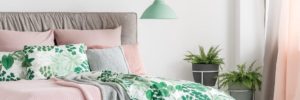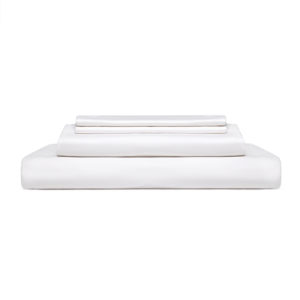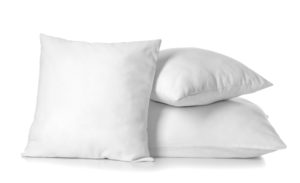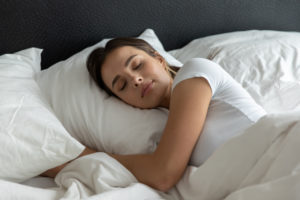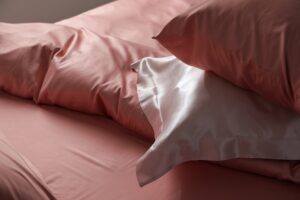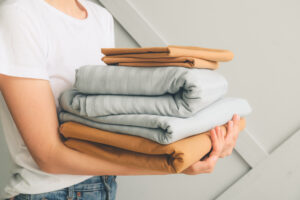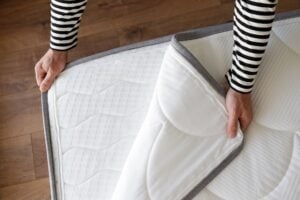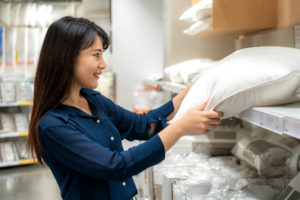What Is Ethical Down?
- Down is a common fill for duvets and pillows that consists of soft, insulating feathers gathered from ducks and geese.
- Ethical down products ensure the feathers are sourced from farms that meet certain standards for quality of life.
- For those who prefer not to use bedding products derived from animals, down alternative bedding closely mimics the properties of down and is typically less expensive.
Down fill has long been the standard for insulation in bedding like pillows, duvets, and comforters. Down fill consists of soft feather clusters from ducks and geese. Like all animal-derived products, some sources and methods of production are more humane than others. Ethically sourced down reassures shoppers that the feathers were gathered without doing unnecessary harm to animals.
We’ll explore what ethical down is made of, the different methods of sourcing it, and its pros and cons. We’ll also discuss how to look for ethical down products and how ethical down compares to down alternative materials.
What Is Ethical Down Made Of?
Down feathers are the fluffy layer found underneath the larger, tougher exterior feathers on ducks and geese. For visual context, imagine how fuzzy a baby duckling or chick appears before they develop stronger feathers. This soft layer is down.
Ethical down does not refer to how a product is made but rather how the fill is sourced. For example, some down comes from animals raised free of unnecessary harm, but other down is sourced from farms that do not ensure this.
Once harvested, the down is used to make the soft, compressible fill in bedding products like pillows and duvets. The material is also sometimes used for insulation in winter clothing.
In general, down products compress more easily than down alternatives. Down is also naturally warmer than synthetic fills. This means that down alternative comforters and pillows may be heavier since more material is needed to achieve the same level of insulation.
Sourcing Ethical Down
The fills of ethical down products are traceable to farms that raise animals without causing undue harm. These products generally have a certification from Responsible Down Standard (RDS), Global Traceable Down Standard (GTDS), or Downpass.
Most ethical down comes from farms that sell the feathers of ducks and geese raised for meat. The ethical label means that the farms meet standards for quality of life and do not force-feed or live-pluck the animals.
Eiderdown
Female eider ducks pluck the feathers off their chests and use it to line their nests for insulation. Once the birds leave their nests, the down can be harvested, ensuring no harm is done to the animals.
Down from eider ducks is exceptionally light, and its insulating properties are superior to those of even goose down. The majority of eiderdown comes from Iceland. Eiderdown products are generally very expensive, with many duvets and comforters priced from $3,000 to $10,000, and some costing more.
Recycled or Pre-Loved Down
Shoppers who value sustainability might also consider buying bedding made from recycled down or purchasing down products secondhand.
Recycled down is collected from used or unsellable items. The production process is the same as that of products made with virgin down, so there shouldn’t be a difference in how the fill feels. That said, because recycled down comes from multiple items, it can be difficult to determine the source.
Additionally, since down products can last 10 to 15 years or more, it’s often possible to find quality pre-loved bedding items at vintage or secondhand retailers.
Benefits of Ethical Down
Ethical down is a good choice for shoppers who want the plush feel and durability of down but want to be certain about the source of the material. Ethical down certifications allow you to track where the feathers were sourced and ensure they weren’t obtained from birds subjected to harmful practices.
However, as with most sustainable and organic bedding products, ethical down is generally more expensive. It’s important to note that ethical down usually consists of feathers from animals raised for food, and that the ethical label only signifies that farms meet certain standards for quality of life.
Ethical Down
| Pros | Cons |
|---|---|
|
|
How to Look for Ethical Down Products
The most common certifications for down products include Responsible Down Standard and Global Traceable Down Standard. Both certifications issue their labels based on how the ethical down is sourced. They require that down sources be traceable and that farms adhere to a set of regulations regarding animal welfare.
Products may also be certified by Downpass, which is a German certification. Shoppers can track the source of down in certain products with Track My Down, an online tool developed by Allied Feather & Down.
Some down products have certification from the American Down and Feather Council. This certification does not refer to how the material is sourced, but simply means the quality and composition of the fill have been evaluated according to a set of standards and the claims on the product label are accurate.
Is Down Sustainable?
When it comes to sustainability, down boasts a number of advantages. It’s natural, biodegradable, and recyclable, and with proper care, it can last a very long time.
That said, its sustainability becomes more debatable when considering that even ethical down is often tied to the meat industry, which leaves a large ecological footprint. Down feathers are sold as a byproduct of farms that produce meat, which means that the farm’s resources would be used regardless. Many argue that this factor makes down sustainable, but others contend that even indirect financial support of the industry is problematic for the environment.
Ethical Down vs. Down Alternative vs. Recycled Down
Those who want to completely bypass products sourced from animals may opt for a comforter or pillow filled with down alternative, or a product that uses recycled down.
Down alternatives use synthetic materials to mimic the warmth, breathability, and softness of down. A number of products come close to matching ethical down’s qualities, and they are usually less expensive. While down products are typically fluffier, more durable, and compressible, bedding products filled with down alternatives are generally machine-washable.
Recycled down products include down from used items to create a sustainable alternative to virgin down. While these recycled fills generally offer the same performance, consumers may not be able to trace the source of the feathers or ensure uniformity since they are sourced from multiple products.
Are There Sustainable Down Alternatives?
Down alternative fills are made from a variety of materials, including polyester and microfiber. Some manufacturers use naturally occurring materials such as cotton and hemp, which are biodegradable like down.
However, synthetic materials like polyester are more common, and these products are not biodegradable. Some companies also use recycled plastics to make the polyester fills. In general, products made with down alternatives do not last as long as those made with down.

